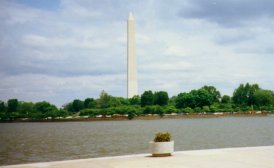
 |
The Washington Monument at 555 feet, 5 1/8 inches, towers over
everything in the Nation's Capital and reminds us of the
immensity of George Washington's contribution to this republic.
The monument is a classic obelisk and has little in common with
the colonnaded temple designed by Robert Mills to house statues
of America's heroes. The cornerstone was laid July 4, 1848, in a
ceremony attended by President James K. Polk and other
dignitaries, among whom were Representatives Abraham Lincoln and
Andrew Johnson. The monument rose steadily to 152 feet financed
by popular subscriptions collected by the Washington Monument
Society until funds ran out in 1853. It stood unfinished for
nearly 25 years until President Ulysses S. Grant approved an act
authorizing the Federal Government to complete the project. Lt.
Col. Thomas Casey, U.S. Army Corps of Engineers, took control,
simplified Mills' design, and began construction. In December
1884 a 3,300-pound marble capstone as placed on the obelisk and
topped with a 9-inch pyramid of cast aluminum, a rare metal in
1884.
Visiting the Monument |
 |
The Washington Monument is open every day except December 25 from 9 a.m. to 5 p.m., September through March; April through August. An elevator carries visitors to the 500-foot level in 70 seconds to see spectacular views of the city named for George Washington. A small facility at the top offers information for sale. Park interpreters lead scheduled tours that walk down the 897 steps past 193 memorial stones presented by individuals, societies, cities, states, and nations. Check with a park ranger for times and details.
The Washington Monument is a unit of the National Park System, which consists of more than 360 parks representing important examples of our country's natural and cultural heritage. For more more information, write: Superintendent, National Capital Parks-Central, 900 Ohio Drive SW, Washington, DC 20242.
Text reprinted from National Park Service Brochure, Government Printing Office, 1995.
To learn more about the Washington Monument, visit the National Park Service web site that contains additional photos and data at http://www.nps.gov/wamo/.